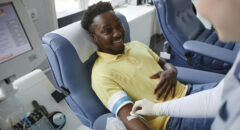
When you first get diagnosed with something, your immediate thought is probably "how do I get the appropriate treatment as soon as possible before it progresses?" However, a man with prostate cancer who takes the "watch-and-wait" approach may have the same long-term survival odds as those who undergo radiation therapy or surgery, according to a new large-scale study.
Patients had the same 97 percent survival rate after a decade and a half whether doctors treated their tumor or simply put it under observation, British researchers found.
"Survival from prostate cancer was high after 15 years of follow-up, whether patients received radiotherapy, prostatectomy [prostate removal] or active monitoring," said study co-author Jenny Donovan, a professor of social medicine with the University of Bristol. "Only three percent of patients in the study died from prostate cancer."
Researchers presented the findings last weekend at the European Association of Urology's annual meeting, in Milan, and the results were published simultaneously in the New England Journal of Medicine.
RELATED: At High Risk of Prostate Cancer? Here’s How to Lower Your Odds
The 'watch and wait' approach
For the study, researchers evaluated nearly 82,500 men in the United Kingdom who underwent a prostate-specific antigen (PSA) test between 1999 and 2009.
The study recruited just over 1,600 men diagnosed with localized prostate cancer as a result of their screening and randomly assigned them to one of three groups -- an active monitoring group, a group that underwent surgery to remove their prostate, and a group that received radiation therapy for their cancer.
After 15 years, only 45 had died -- 17 in the active monitoring group, 12 in the surgery group and 16 in the radiation therapy group.
Men on active monitoring were more likely to see their cancer progress or spread, but this didn't reduce their chances of long-term survival.
As a result, the researchers concluded that men diagnosed with low- or moderate-risk prostate cancer don't need to panic and rush their treatment decisions.
"Many patients with prostate cancer contained to the prostate could delay or forgo radical treatment without compromising quality of life or longevity," Donovan shares. "All men with low-risk and many with moderate-risk prostate cancer could safely choose surveillance over surgery or radiation."
The risks and benefits of screening
The new study adds more fuel to the ongoing controversy over the benefits and risks of prostate cancer screening.
Prostate cancer rates in the United States rose by three percent a year between 2014 and 2019 after two decades of decline, and advanced prostate cancers increased by about five percent a year, the latest American Cancer Society statistics show.
As a result, some experts are rethinking guidelines that currently leave prostate cancer screening a personal choice between a man and his doctor.
The American Cancer Society (ACS) is reevaluating its own guidelines, which recommend that doctors discuss screening at age 40 for men with a close relative who's had prostate cancer, at 45 for men at high risk of prostate cancer, and at 50 for nearly all other men, ACS Chief Scientific Officer Dr. William Dahut says.
"I actually think having the PSA value does make it much easier to have shared decision-making," Dahut adds. "If the PSA value is very high, that puts you forward to maybe consider an MRI and then a biopsy. If it's very low, don't do anything about it. If it's in the middle, then we watch it for a while. But not having that number, I do think it makes it much more difficult to really give good advice."
However, Donovan says these new results seem to indicate that more prostate cancer screening will only lead to unnecessary medical procedures.
"Men should carefully consider all the potential consequences of having a PSA test before deciding to have one," Donovan advises. "A PSA test can be followed by a snowball of further testing, including biopsies of the prostate, and, if there is a cancer, the likelihood is that it would be of localized and low-risk. Then there will be difficult decisions to make about treatment, and a 'healthy' man can become a 'cancer patient' unnecessarily."
Dahut did note that nearly twice as many men assigned to active monitoring had their prostate cancer spread into other parts of the body during the 15-year follow up -- 51 men (9.4 percent) in the active-surveillance group, compared with 26 (4.7 percent) in the surgery group and 27 (5 percent) in the radiation group.
"The fact that people who could have had treatment and could have potentially never had their cancer come back instead waited until the cancer was metastatic. For me, that's really quite concerning," Dahut says.
Other experts take a different view, arguing that the study shows even men with metastases don't necessarily die from their prostate cancer.
"The fact that the greater progression of disease seen under active monitoring didn't translate into higher mortality will be both surprising and encouraging to urologists and patients," Dr. Peter Albers, a urologist at Dusseldorf University and chair of the European Association of Urology's Scientific Congress, said in a meeting news release.
"Active monitoring and biopsy protocols today are much more advanced than at the time this trial was conducted, so it's possible we could improve on these outcomes still further. It's an important message for patients that delaying treatment is safe, especially as that means delaying side effects as well," according to Albers.
Patients from all three groups reported a similar overall quality of life, but the negative effects of treatment on urinary, bowel and sexual function persisted much longer than previously thought.
Men who underwent surgery or radiation therapy suffered from incontinence, impotence and other side effects for up to 12 years, researchers said.
"Surgery can lead to reduction in sexual function as well as urine leakage, which may require one in five men to wear pads for protection," Donovan says. "Radiotherapy leads to a decline in sexual function, and also some fecal leakage can occur."
The clinical trial also highlighted flaws in the screening methods used to predict which prostate cancers are likely to grow quickly and spread.
Initially, about three out of four (77 percent) of the participants were deemed to have low-risk cancer, but a reassessment using more modern methods showed that a far greater number would now be considered to have intermediate-risk cancer.
In fact, in about 30 percent of the men their cancer had already spread beyond the prostate.
Dahut notes that monitoring of diagnosed prostate cancers has vastly improved since this trial started, and is much more sophisticated these days.
"We've evolved a little bit from the term 'watchful waiting' to the term 'active surveillance,'" Dahut says. "It's a very active process now where you're monitoring the cancer and if there are changes of concern, then you reassess whether intervention is needed. Today, we would monitor them more intensively, oftentimes using MRI."
RELATED: Not Ready For A Biopsy? Talk To Your Doctor About These 3 Alternatives
Talking with your doctor
It’s important to discuss your options and possible pros and cons, with your doctor. He or she can help you choose one you are comfortable with. The following factors might will help determine which option is best for you:
- Your age and overall health
- The likelihood that you have prostate cancer (based on tests done so far)
- Your own comfort level with waiting or getting further tests








